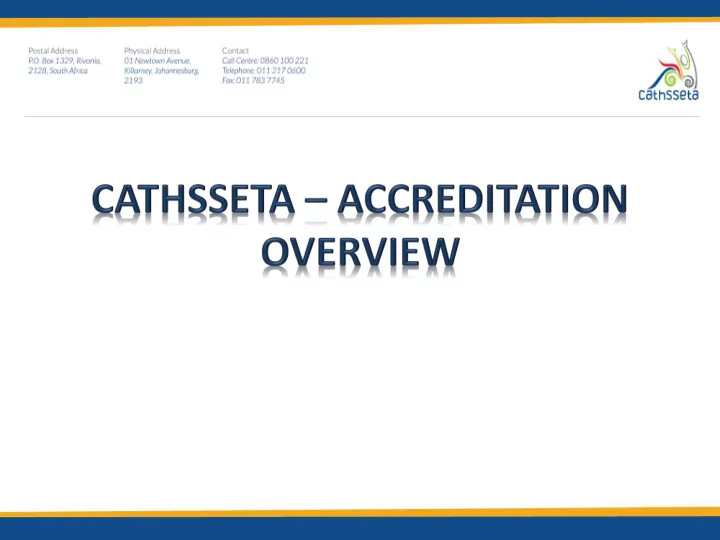

PRESENTATION OVERVIEW • About us • Legislative Framework • ETQA Scope • Accreditation • Common mistakes • Monitor/Audit
About US • 6 sub-sectors Arts, Culture & Heritage Travel & Tourism Hospitality Sport, Recreation & Fitness Gaming & Lotteries Conservation
ETQA SCOPE Accredit providers Monitor and audit providers External Moderation Quality assure US and Qualifications Take responsibility for the certification of learners Register assessors & moderators
ACCREDITATION MODEL Provider Types Non- Constituent Constituent Accredit Register
LEGISLATIVE FRAMEWORK • ETQA Regulations Accredit providers for specific standards or qualifications Promote quality amongst providers Monitor provision by constituent providers Evaluate assessments and moderation amongst providers Register Assessors and Moderators Take responsibility for the certification of learners Maintain a database acceptable to the Authority Submit reports to the Authority
ACCREDITATION EVIDENCE REQUIREMENTS Step 1 – Phase A Phase A process is structured as follows: 1. The training provider completes the application form 2. The form can be posted, hand delivered or couriered 3. The ETQA office sends an acknowledgement of receipt and informs the provider to proceed to Phase B
ACCREDITATION EVIDENCE REQUIREMENTS Step 2 - Phase B The training provider compiles a Portfolio of Evidence according to Criteria 1 - 8: Criteria 1 : The primary focus of the Provider coincides with that of the ETQA Criteria 2: The provider has not already been accredited with another ETQA Criteria 3: The body seeking accreditation is registered in terms of applicable legislation at the time of the application
ACCREDITATION EVIDENCE REQUIREMENTS Criteria 4: Organizational Practices Quality Management System: Policy 1: Managing the QMS Policy 2: Managing programme design, development and delivery Policy 3: Managing assessment & moderation Policy 4: Managing learnerships Policy 5: Managing ETD Staff Policy 6: Managing administration
ACCREDITATION EVIDENCE REQUIREMENTS Criteria 5: The provider has the necessary resources such as financial, administrative and physical resources Criteria 6: The provider has the necessary practices for staff selection, appraisal and development Criteria 7: The provider can demonstrate their ability to develop, deliver and evaluate learning programmes which culminate in specific registered standards and / or qualifications Criterion 8: The provider has the appropriate policies and practices for: • Learner entry, guidance and support system • The management of off-site practical or work-site components where applicable
COMMON MISTAKES THAT PROVIDERS MAKE 1. Submitting incomplete policies 2. Submitting policies that do not meet the requirements 3. Submitting samples of learning programmes 4. Not demonstrating availability of human and physical resourcing 5. Copying policies from the internet and not customising them
AREAS OF FOCUS FOR PROGRAMME DESIGN Practical Assessments Practicals can only be observed, therefore they require an observation checklist Expired unit standards Unit standards within a qualification adopt the life span of the qualification Purchasing material Purchased material still needs to be evaluated
MONITOR/AUDIT In order for CATHSSETA to fulfill our quality Assurance function we monitor and Audit providers Types of visits: Monitoring Verifications Audits
CHALLENGES IN IMPLEMENTATION OF LEARNING PROGRAMMES Lack of access to SETA management System Limited knowledge of the functionality of the system. Miscommunication regarding the loading of learners that are SETA funded and those who are Industry Funded Loading of learners assessment
CHALLENGES IN IMPLEMENTATION OF LEARNING PROGRAMMES Impact of missing core or fundamental and elective unit standards credits on Certification Issuing of certificates to learners Usage of non-registered assessors and moderators Delaying the process the learners on the sms system
QCTO NEW DEVELOPMENTS ETQA & QCTO Visits CHEF Qualification Realigning of the 6 Qualification NC: Food and Beverages NC: Fast Food Services NC: Nature Conservation Resource Guardianship NC: Gaming Operations (ID: 63269) FETC: Sport Coaching – Juniors and Beginners NC: Coaching Science (ID: 67695)
NEW CHANGES Skills Programme process restructuring effective 1 April 2017 Letter of intent Submission of learner agreements with certified ID copy Registration Certification – ID copies
Thank You
Recommend
More recommend